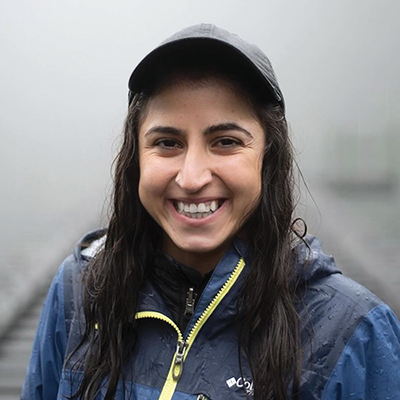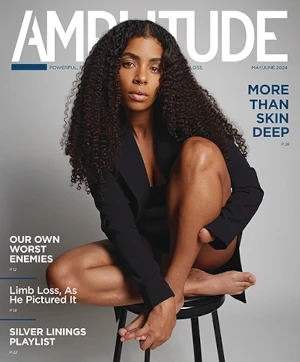by Angelina Martinson

When I was 16, I thought, “I bet I’ll make it to the Paralympics one day.” Spoiler alert: I will not be competing in Paris later this summer.
But I’m really looking forward to watching the Games anyway. The Paralympics dispel negative stereotypes about disability, and that made a huge impact on me as a young amputee. I used to get bullied in school for my limb difference, and I hated my disabled body. I would spend lots of nights crying in my mom’s arms. The next day, I would pick myself up and try to prove those bullies wrong.
My parents instilled in me the idea that disabled didn’t mean inferior. “Nobody can make you feel inferior without your consent,” my mom always said. But it was hard, because I was the only disabled kid in my world. I never saw other amputees on the soccer field or in my ballet class. I would only see the occasional amputee at the hospital. This was really discouraging.
The Paralympics were the first time I saw other disabled people being active, and I was so excited. In high school I clipped a magazine article about Melissa Stockwell, who swam for Team USA in the 2008 Paralympics. I was so inspired by her that I tried out for my school’s swim team—and I not only made the team, I was eventually elected captain.
I really stood out as I hopped to my starting block on one leg, the only disabled swimmer in the pool. It was such a vulnerable position for a teenager, but I liked the competition. And whether or not I won my race, I proved the bullies wrong and upheld my parents’ words: Disabled didn’t mean inferior.
At that time, it felt like athletics were my only option to achieve that. But as the Paralympics achieved greater visibility, they started to prompt different feelings of inferiority. Elite amputee athletes were being featured in magazines and commercials, and I could not relate to the “superhero” ideal they represented. Why were these amputees so much stronger, faster, and better than me? If I was less than super, did it mean I was failing as an amputee?
I had felt alone as a kid because I only had the able-bodied community to compare myself to. As the Paralympics gained stature, I started comparing myself to the “super-amputee” standard. Both worlds felt unattainable, and I felt like I didn’t belong in either of them.
I went off to college with the goal of changing this perspective for not only myself, but also for other amputees. I got a degree in engineering, in the hope that I could build better prosthetic devices and support other amputees through my work. I also developed a social media presence (Adaptive Amputees) to spotlight life as an average, everyday amputee, navigating between the “inferior” and “super” myths.
My first job after college was at a hospital in Chicago, where I worked as a prosthetic technician. One day, a familiar face walked into the clinic: Melissa Stockwell, my old role model and hero.
I was starstruck. Without her example, I might never have gained the confidence to set ambitious goals for myself. But Melissa was also one of those exceptional amputees whose example seemed impossible to live up to. Because of her, I felt worthy . . . . and not worthy.
But to Melissa, my worthiness wasn’t ever in question. Her athletic nonprofit, Dare2Tri, was holding a triathlon that weekend, and she encouraged me to sign up for it. I had never run a triathlon before and had absolutely zero training, but I immediately said yes. Would you tell your hero no?
Right away, we started working on a running blade for me to wear in the race. I had worked on running blades for other people before, but I had never worn one myself. So in one remarkable day, I met my hero, built my first running blade, and signed up for my first triathlon.
That weekend at Dare2Tri changed my life. I met athletes with all kinds of disabilities—limb difference, vision impairment, paralysis, and many more. Some of the participants were actual Paralympians, but many were like me—regular people who had no idea what we were doing.
During the swim (the first leg of the race), I started experiencing hypothermia symptoms. My body got really stiff, my breathing slowed, and I became so disoriented and weak that I had to be pulled out of the water and put into a heated car. I was determined to finish the race, even though I was well behind everyone else. I completed the bike portion fairly easily, but I still had to finish the three-mile run—and I had never run on a blade before.
Then Melissa came up and asked if she could run with me. This was a huge encouragement. As we got going, she shared some tips she uses to help her get to the finish line, and she kept pace with me for the entire run. I finished dead last, but I did not feel inferior. Far from it.
Instead, I felt like I belonged.
The experience helped me learn how to be a Paralympian on my own terms. I had risen to a grueling physical and mental challenge. I had set a goal and achieved it. I realized I had more in common with the Melissa Stockwells of the world than it might appear. No, I could never compete on her level, but I’m okay with that. That actually isn’t a goal of mine.
My goal is to meet more people like me. To encourage amputees who feel overwhelmed by the “super-amputee” complex society places on us. To challenge myself to get a little bit better each day, and take satisfaction in my progress.
I plan to watch the Paralympics with some other amputees this year. And we’ll be watching in the same spirit: No matter your level of ability, set your own goals and cross your own finish line, whatever that looks like.
Angelina Martinson is a biomedical engineer specializing in medical devices and prosthetic technology. Follow her on Instagram at @adaptiveamputees.




